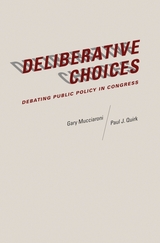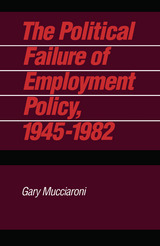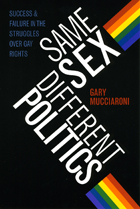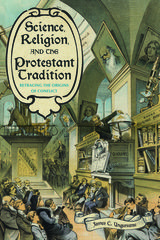
Mucciaroni and Quirk argue that in fashioning the claims they use in debate, legislators make a strategic trade-off between boosting their rhetorical force and ensuring their ability to withstand scrutiny. Using three case studies—welfare reform, repeal of the estate tax, and telecommunications deregulation—the authors show how legislators’ varying responses to such a trade-off shape the issues they focus on, the claims they make, and the information they provide in support of those claims.
Mucciaroni and Quirk conclude that congressional debate generally is only moderately realistic and informed. It often trades in half-truths, omissions, and sometimes even outright falsehoods. Yet some debates are highly informative. Moreover, the authors believe it’s possible to improve congressional deliberation, and they recommend reforms designed to do so.

This political history analyzes the failure of the United States to adopt viable employment policies, follows U.S. manpower training and employment policy from the 1946 Employment Act to the Job Training Partnership Act of 1982. Between these two landmarks of legislation in the War on Poverty, were attempts to create public service employment (PSE), the abortive Humphrey-Hawkins Act, and the beleaguered Comprehensive Employment and Training Act (CETA).
Mucciaroni's traces the impact of economic ideas and opinions on federal employment policy. Efforts at reform, he believes, are frustrated by the tension between economic liberty and social equality that restricts the role of government and holds workers themselves accountable for success or failure. Professional economists, especially Keynesians, have shaped the content and timing of policy innovations in such ways as to limit employment programs to a social welfare mission, rather than broader, positive economic objectives. As a result, neither labor nor management has been centrally involved in making policy, and employment programs have lacked a stable and organized constituency committed to their success. Finally, because of the fragmentation of U.S. political institutions, employment programs are not integrated with economic policy, are hampered by conflicting objectives, and are difficult to carry out effectively.
As chronic unemployment and the United States' difficulties in the world marketplace continue to demand attention, the importance of Mucciaroni's subject will grow. For political scientists, economists, journalists, and activists, this book will be a rich resource in the ongoing debate about the deficiencies of liberalism and the best means of addressing one of the nation's most pressing social and political problems.
Mucciaroni's provocative theoretical analysis is buttressed by several years' research at the U.S. Department of Labor, access to congressional hearings, reports, and debates, and interviews with policy makers and their staffs. It will interest all concerned with the history of liberal social policy in the postwar period.

READERS
Browse our collection.
PUBLISHERS
See BiblioVault's publisher services.
STUDENT SERVICES
Files for college accessibility offices.
UChicago Accessibility Resources
home | accessibility | search | about | contact us
BiblioVault ® 2001 - 2024
The University of Chicago Press









